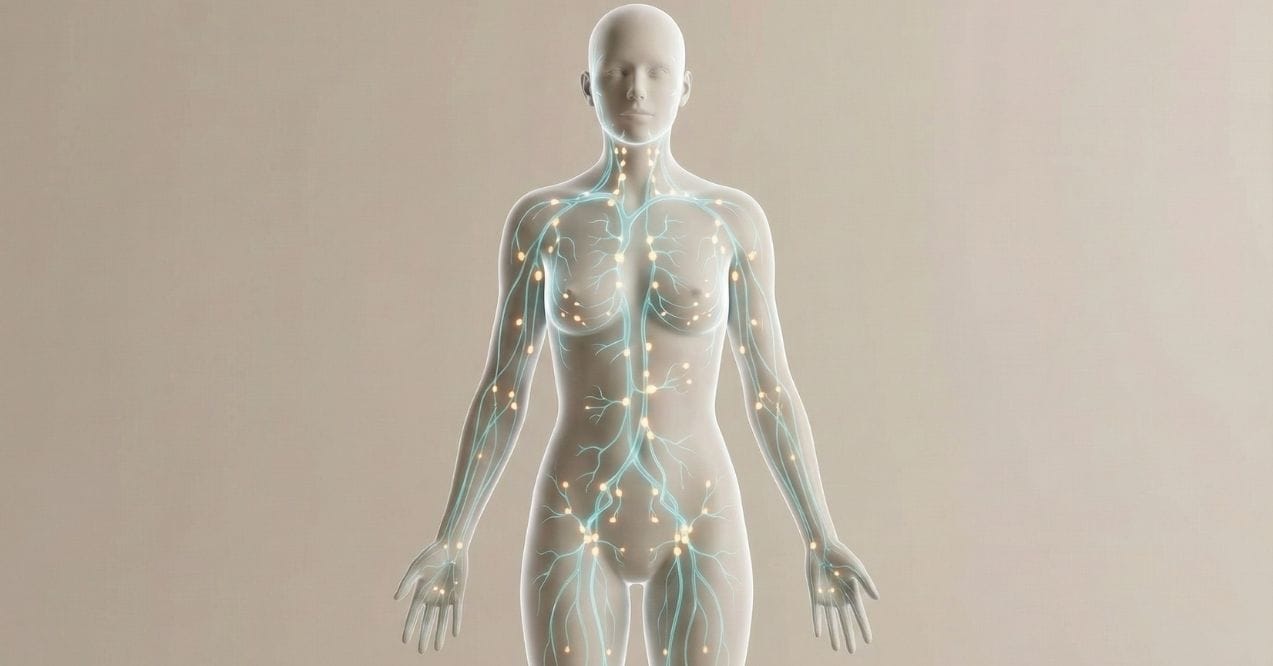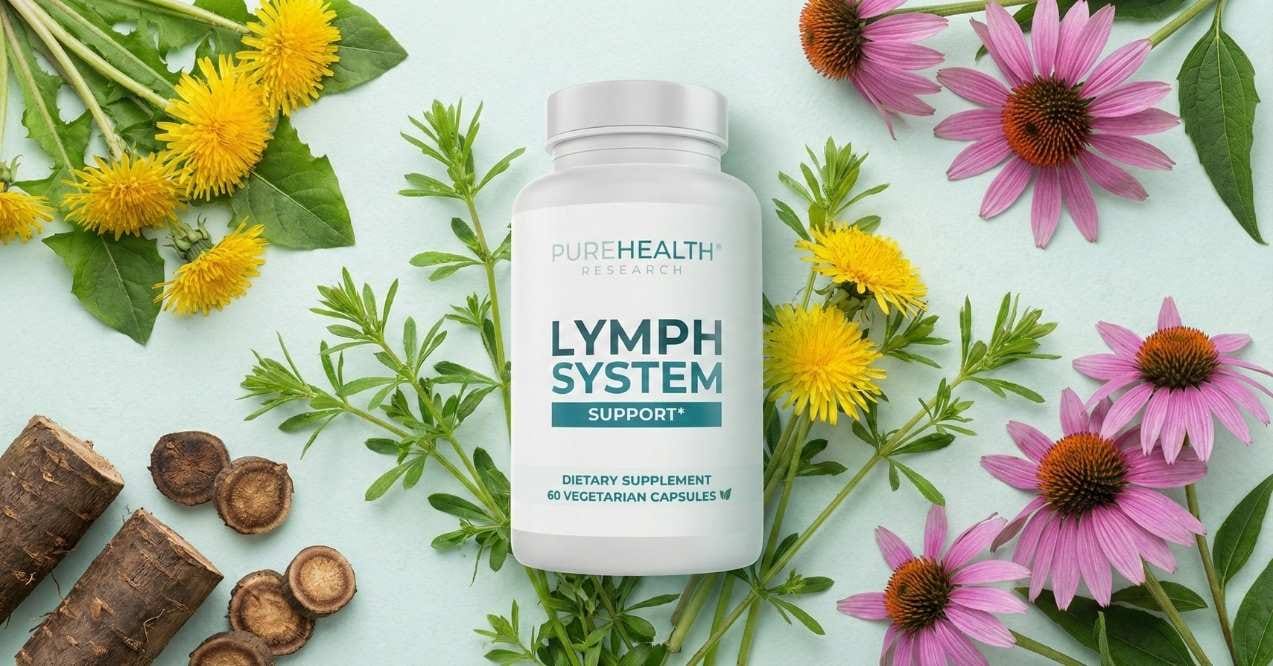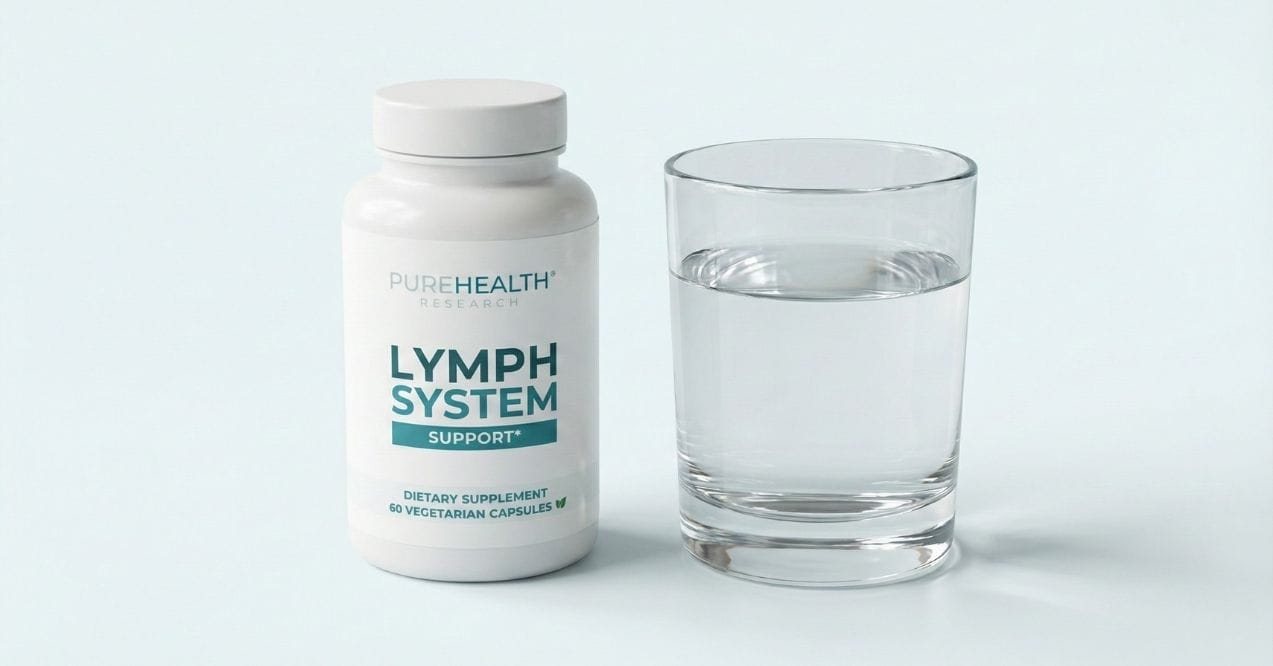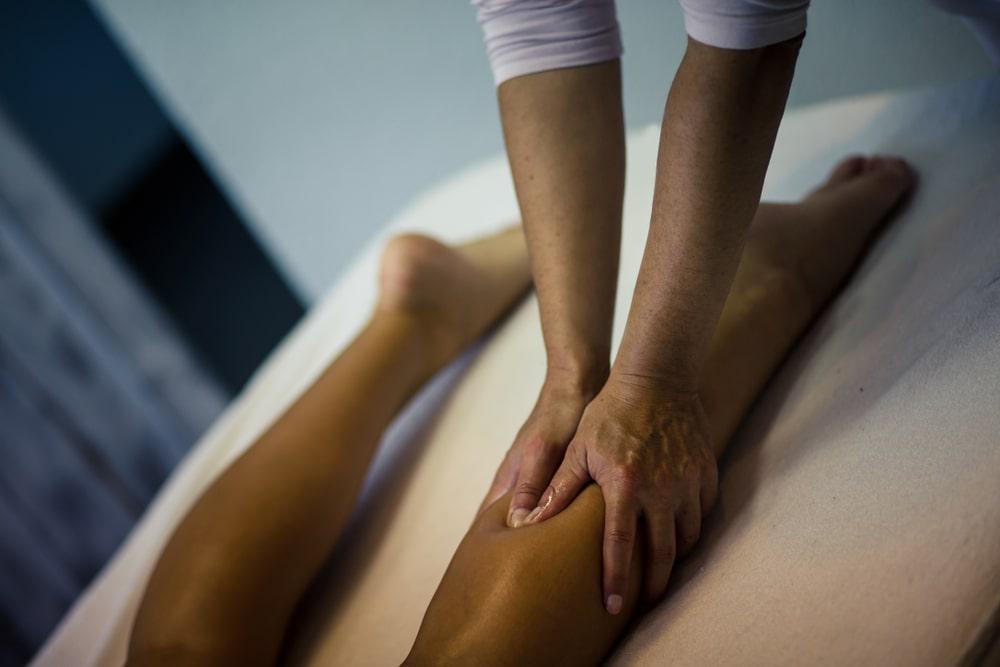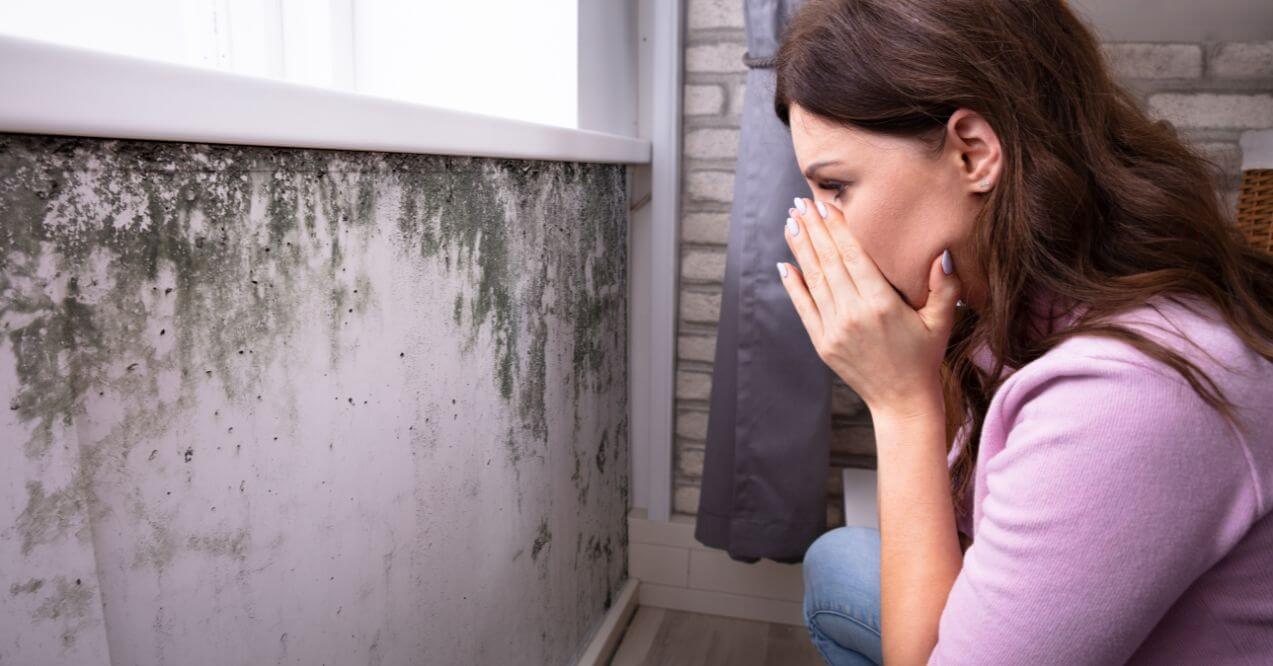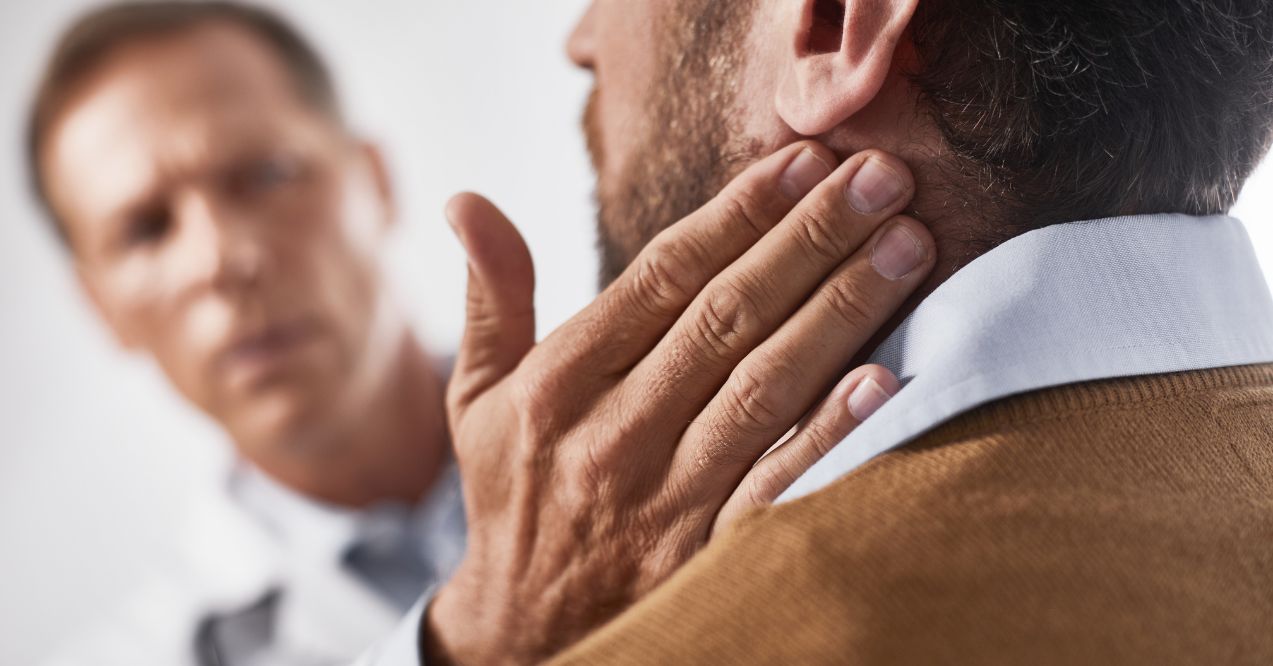Can Dehydration Cause Swollen Lymph Nodes?
Can dehydration cause swollen lymph nodes? Learn how hydration affects lymphatic health and discover natural ways to support optimal function


Discovering a swollen lymph node can be alarming, leaving many to wonder about its possible causes. The lymphatic system – a network of vessels and nodes – plays a crucial role in supporting immunity and maintaining overall health. These nodes act as filters, trapping unwanted substances and helping the body stay balanced. But can dehydration cause swollen lymph nodes?
In this blog, we’ll explore the potential connection between dehydration and lymph node swelling. We’ll also discuss common symptoms, other possible causes, and practical tips for staying hydrated and supporting your lymphatic system for overall well-being.
Can Dehydration Actually Cause Swollen Lymph Nodes?
So, can dehydration cause swollen glands? While dehydration itself rarely directly causes lymph node swelling, it can impact how effectively your lymphatic system functions. Your lymphatic system relies on proper fluid balance to move lymph – a clear, watery fluid that carries away waste materials from your tissues.
When you don’t drink enough water, your body conserves fluids, which can slow down lymphatic flow. Think of your lymphatic system as a river – when water levels drop too low, the current slows down, and materials that would normally flow downstream begin to accumulate. In your body, this slower flow means waste products and other substances may not move through your lymph nodes as efficiently as they should.
This sluggish movement can make your lymphatic system work harder, occasionally leading to temporary lymph node enlargement as these nodes continue their important task of filtering substances from the lymph fluid.

Symptoms of Dehydration-Induced Swollen Lymph Nodes
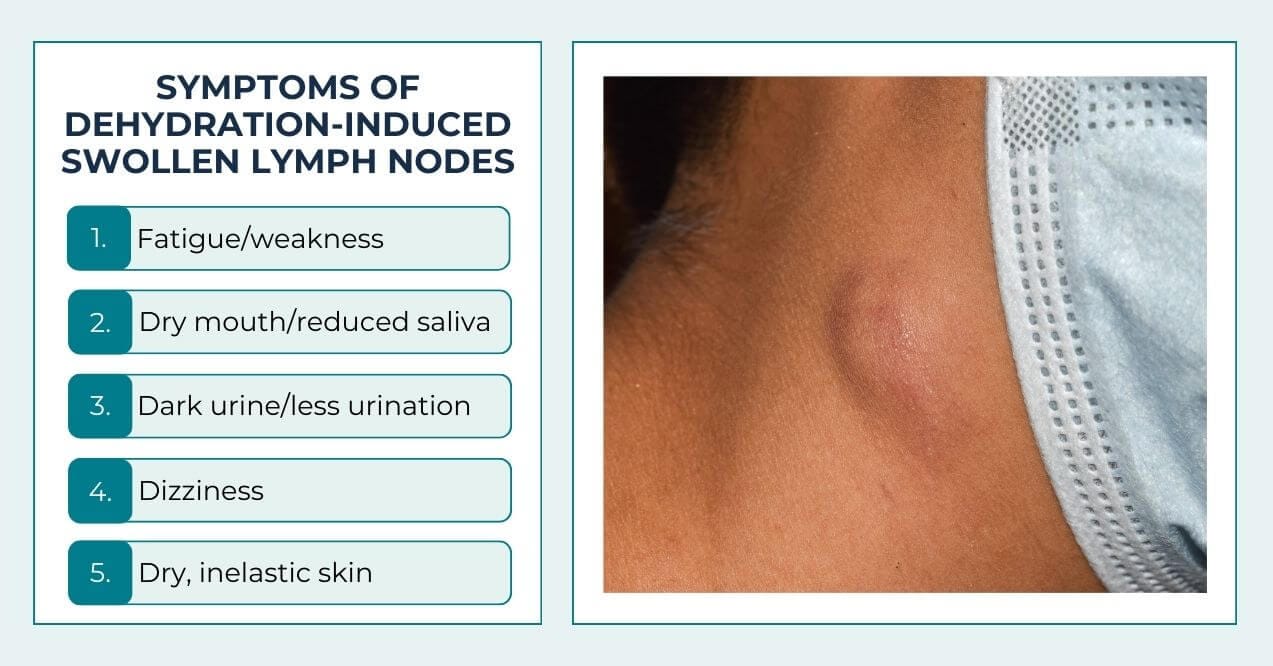
When your lymph nodes swell due to dehydration, you might notice small, soft lumps on jawline about the size of a pea, particularly around your neck, under your jaw, or behind your ears. These swollen areas may feel tender when touched but typically shouldn’t be painful.
Unlike other types of lymph node swelling, those affected by dehydration often appear alongside other signs of insufficient fluid intake. You might experience:
- Feeling unusually tired or weak, as your body struggles to maintain proper fluid balance
- A dry, sticky feeling in your mouth and reduced saliva production
- Darker urine color and less frequent bathroom visits
- Dizziness, especially when standing up quickly
- Skin that feels dry and less elastic
Enlarged preauricular lymph nodes – the ones located just in front of your ears – may become more noticeable when you’re dehydrated. Your body’s lymph fluid, which normally flows freely through these nodes, becomes more concentrated as water levels drop. Wondering, does lymph evaporate when blood dries? The reality is that lymph fluid becomes thicker and moves more slowly when you’re not properly hydrated.
If your lymph nodes remain swollen after reestablishing proper hydration, this could indicate other underlying factors requiring attention.
Other Causes of Swollen Lymph Nodes
While dehydration may affect your lymphatic system, it’s essential to understand that lymph node swelling often stems from other sources. Your lymph nodes are like security checkpoints that become more active when they detect potential concerns in your body.
- Common Infections – Your lymph nodes may temporarily enlarge when your immune system responds to throat irritation, ear discomfort, or general bodily responses. This swelling typically subsides as your body naturally addresses these temporary challenges.
- Other Health Considerations – In some situations, persistent lymph node swelling might signal more significant health issues that require professional attention, such as autoimmune conditions, certain medications’ side effects, or other underlying medical conditions.
If swelling persists beyond several weeks or is accompanied by unexplained symptoms, consulting a healthcare provider is recommended for proper evaluation and diagnosis.
Tips for Preventing Dehydration
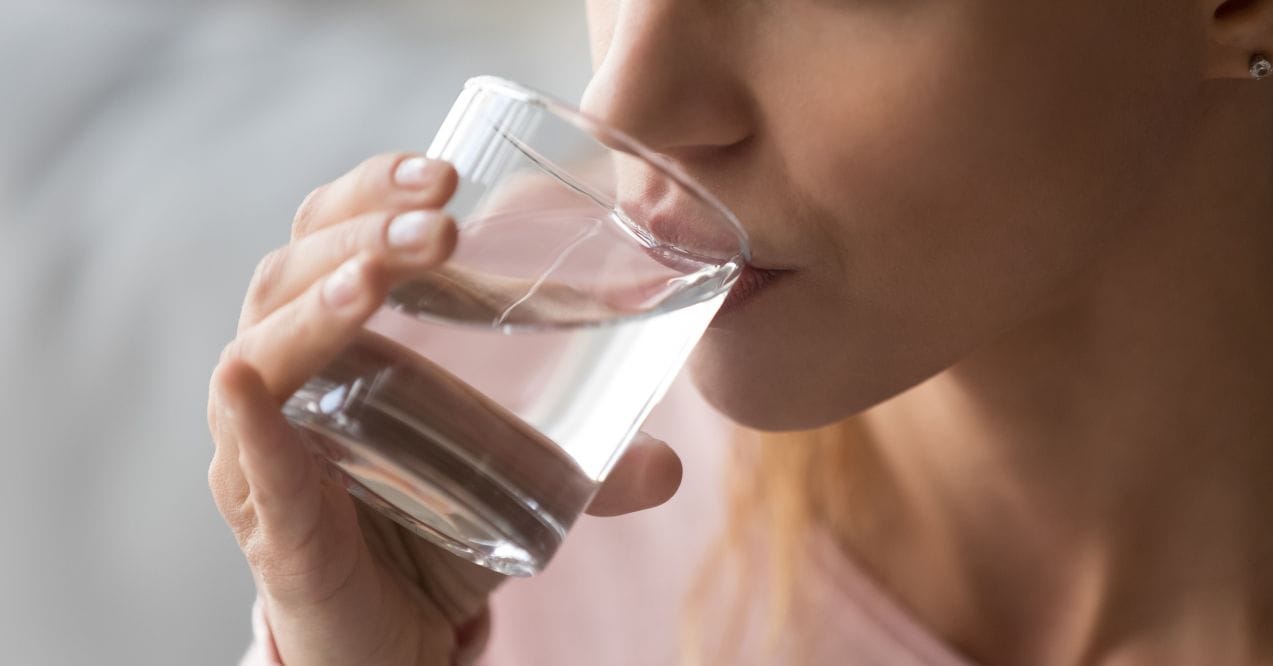
Dehydration swollen glands can be alleviated by maintaining proper fluid balance in your body. Staying well-hydrated supports your lymphatic system’s natural ability to function efficiently.
Here are simple ways to maintain healthy hydration levels:
- Sip water regularly throughout your day instead of waiting until you feel thirsty. Consider keeping a reusable water bottle nearby as a helpful reminder.
- Monitor your hydration status by checking your urine color – pale yellow indicates good hydration, while darker shades suggest you need more fluids.
- Include water-rich foods in your daily meals. Cucumbers, watermelon, celery, and citrus fruits naturally contain high amounts of water and can contribute to your daily fluid intake.
- Be mindful of beverages that may increase fluid loss. Coffee, alcoholic drinks, and sugary sodas can affect your hydration levels, so balance these with extra water intake.
- During physical activity or warm weather, consider natural electrolyte sources like coconut water or mineral-rich beverages to maintain proper fluid balance.
Lifestyle Habits for a Healthy Lymphatic System

Beyond staying hydrated, certain lifestyle choices can help maintain your lymphatic system’s natural function. Here are key habits that support healthy lymphatic flow:
- Managing stress – When your body experiences prolonged tension, it can affect your immune system’s natural responses. Can stress cause lymph nodes to swell? Stress can impact immune function, which may indirectly affect how the lymphatic system responds to infections or inflammation.
- Getting regular exercise – Physical activity naturally stimulates lymph flow throughout your body. Simple movements like walking, swimming, or gentle stretching help your lymphatic system move fluid more efficiently, supporting its natural filtering process.
- Healthy diet – A nutrient-rich diet supports optimal lymphatic function. Foods high in antioxidants like leafy greens and berries help protect lymphatic vessels, while essential fatty acids from fish and nuts aid in proper fluid transport. Choosing whole foods over processed options provides your lymphatic system with the nutrients it needs to function effectively.
Additionally, consider adding natural botanicals which may provide additional support for your lymphatic system. Click here to explore our best products designed to enhance your lymphatic health.

When combined with a holistic lifestyle, Lymph System Support may help support your body’s natural cleansing processes and maintain healthy lymphatic organ function.
Final Thoughts
Can dehydration cause swollen lymph nodes? While dehydration itself isn’t typically the primary cause, it can impact your lymphatic system’s ability to function optimally. By maintaining proper hydration levels, staying active, and managing daily stress, you can support your lymphatic system’s natural processes. Consider incorporating natural botanicals alongside these healthy habits. Remember that lymphatic health is an ongoing journey – small, consistent actions can make a meaningful difference in supporting your body’s natural balance and overall wellness.
Dehydration alone rarely causes lymph nodes to swell directly. However, lack of fluids can slow lymphatic flow, making your nodes work harder to filter substances, which might contribute to mild, temporary swelling.
Proper hydration supports healthy lymphatic flow, helping your system function more efficiently. While water alone may not address the underlying cause of swollen nodes, staying well-hydrated helps maintain optimal lymphatic function.
Yes, dehydration impacts the lymphatic system by making lymph fluid thicker and slower-moving. This can reduce your system’s efficiency in removing waste materials and maintaining proper fluid balance throughout your body.
Sign up for our Healthy Living newsletter!
Advertisement. This site offers health, wellness, fitness and nutritional information and is designed for educational purposes only. You should not rely on this information as a substitute for, nor does it replace, professional medical advice, diagnosis, or treatment. If you have any concerns or questions about your health, you should always consult with a physician or other health-care professional. Do not disregard, avoid or delay obtaining medical or health related advice from your health-care professional because of something you may have read on this site. The use of any information provided on this site is solely at your own risk.



